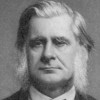As a philosopher, if I were speaking to a purely philosophic audience I should say that I ought to describe myself as an Agnostic, because I do not think that there is a conclusive argument by which one prove that there is not a God. On the other hand, if I am to convey the right impression to the ordinary man in the street I think that I ought to say that I am an Atheist, because, when I say that I cannot prove that there is not a God, I ought to add equally that I cannot prove that there are not the Homeric gods.
Bertrand Russell (1872-1970) English mathematician and philosopher
“Am I an Atheist or an Agnostic?” sec. “Proof of God” (1949)
(Source)
Originally given as a speech, "Agnosticism v. Atheism," Rationalist Press Assoc. Annual Dinner, London (1949-05-20); then printed as "Agnosticism v. Atheism," The Literary Guide and Rationalist Review (1949-07); then released as an essay under this title later in 1949.
Quotations about:
agnostic
Note not all quotations have been tagged, so Search may find additional quotes on this topic.
O God, if there be a God, save my soul, if I have a soul!
(Other Authors and Sources)
Anonymous Soldier, Battle of Blenheim (31 Aug 1704)
Also given as "Oh, God, if there is one, save my soul, if I have one."
The original printed source for this quote appears to be in William King (1685-1763), Political and Literary Anecdotes of His Own Times (1761), who quotes William Wyndham (1688-1740) claiming it "the shortest prayer he had ever heard," given by a common soldier prior to the Battle of Blenheim.
Also attributed to:
- Robert Ingersoll (1833-1899), without citation, supposedly on his deathbed, sometimes with the final phrase "... from hell, if there be a hell!"
- Ernest Renan (1823-1892) as "The Agnostic's Prayer" or "Prayer of a Skeptic [Prière d'un sceptique]" ("Ô Seigneur, s'il y a un Seigneur; sauvez mon âme, si j'ai une âme.")
- Frederick the Great (1712-1786), in M. Goldsmith, Frederick the Great (1929), without citation.
- Voltaire (1694-1778), without citation.
Carol herself was an uneasy and dodging agnostic. When she ventured to Sunday School and heard the teachers droning that the genealogy of Shamsherai was a valuable ethical problem for children to think about; when she experimented with the Wednesday prayer-meeting and listened to store-keeping elders giving unvarying weekly testimony in primitive erotic symbols and such gory Chaldean phrases as “washed in the blood of the lamb” and “a vengeful God…” then Carol was dismayed to find the Christian religion, in America, in the twentieth century, as abnormal as Zoroastrianism — without the splendor.
But when she went to church suppers a felt the friendliness, saw the gaiety with which the sisters served cold ham and scalloped potatoes; when Mrs. Champ Perry cried to her, on an afternoon call, ‘”My dear, if you just knew how happy it makes you to come into abiding grace,” then Carol found the humanness behind the sanguinary and alien theology.
You may call me an agnostic, but I do not share the crusading spirit of the professional atheist whose fervor is mostly due to a painful act of liberation from the fetters of religious indoctrination received in youth. I prefer an attitude of humility corresponding to the weakness of our intellectual understanding of nature and of our own being.
Is there any religion whose followers can be pointed to as distinctly more amiable and trustworthy than those of any other? If so, this should be enough. I find the nicest and best people generally profess no religion at all, but are ready to like the best men of all religions.
Samuel Butler (1835-1902) English novelist, satirist, scholar
The Note-Books of Samuel Butler, “Religion” (1912)
Full text.
Agnosticism is not properly described as a “negative” creed, nor indeed as a creed of any kind, except in so far as it expresses absolute faith in the validity of a principle which is as much ethical as intellectual. This principle may be stated in various ways, but they all amount to this: that it is wrong for a man to say that he is certain of the objective truth of any proposition unless he can produce evidence which logically justifies that certainty. This is what Agnosticism asserts; and, in my opinion, it is all that is essential to Agnosticism.
T. H. Huxley (1825-1895) English biologist [Thomas Henry Huxley]
“Agnosticism and Christianity,” The Nineteenth Century magazine (1889-02)
(Source)
Collected in his Essays Upon Some Controverted Questions, ch. 12 (1892).






